Starter guide to British politics (PDF)
File information
Title: Print
This PDF 1.5 document has been generated by Adobe Illustrator CC (Macintosh) / Adobe PDF library 10.01, and has been sent on pdf-archive.com on 26/04/2017 at 00:56, from IP address 86.187.x.x.
The current document download page has been viewed 302 times.
File size: 309.76 KB (12 pages).
Privacy: public file
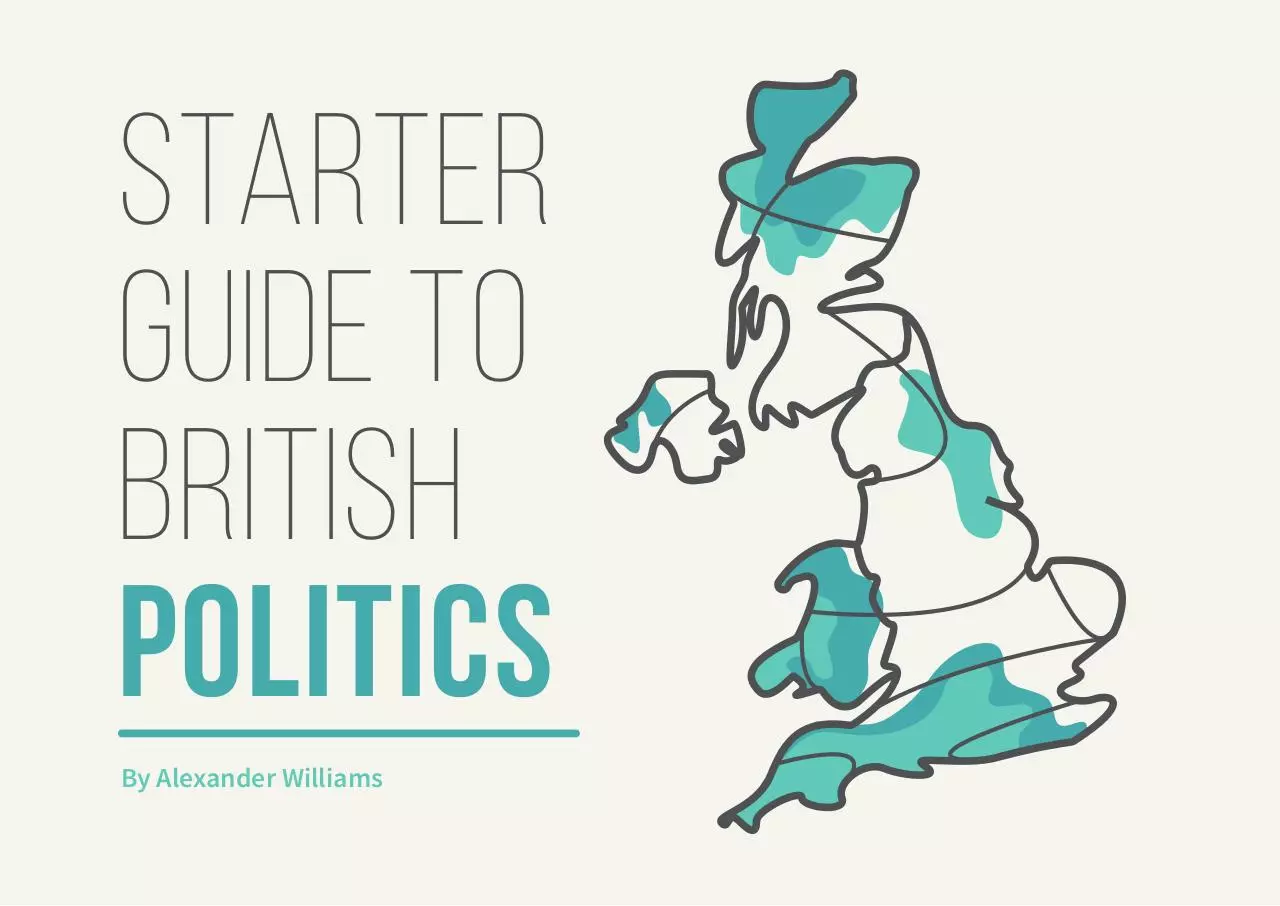
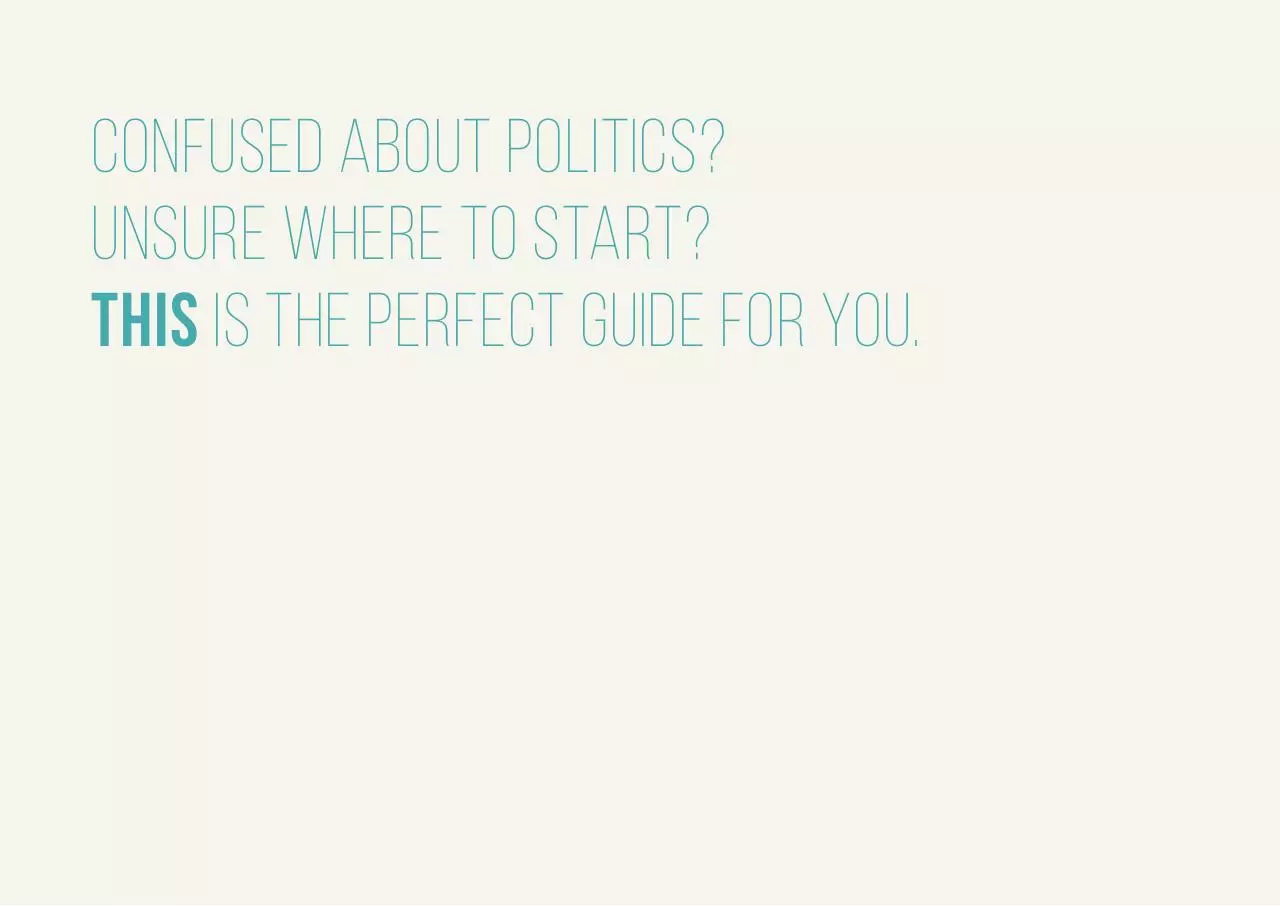
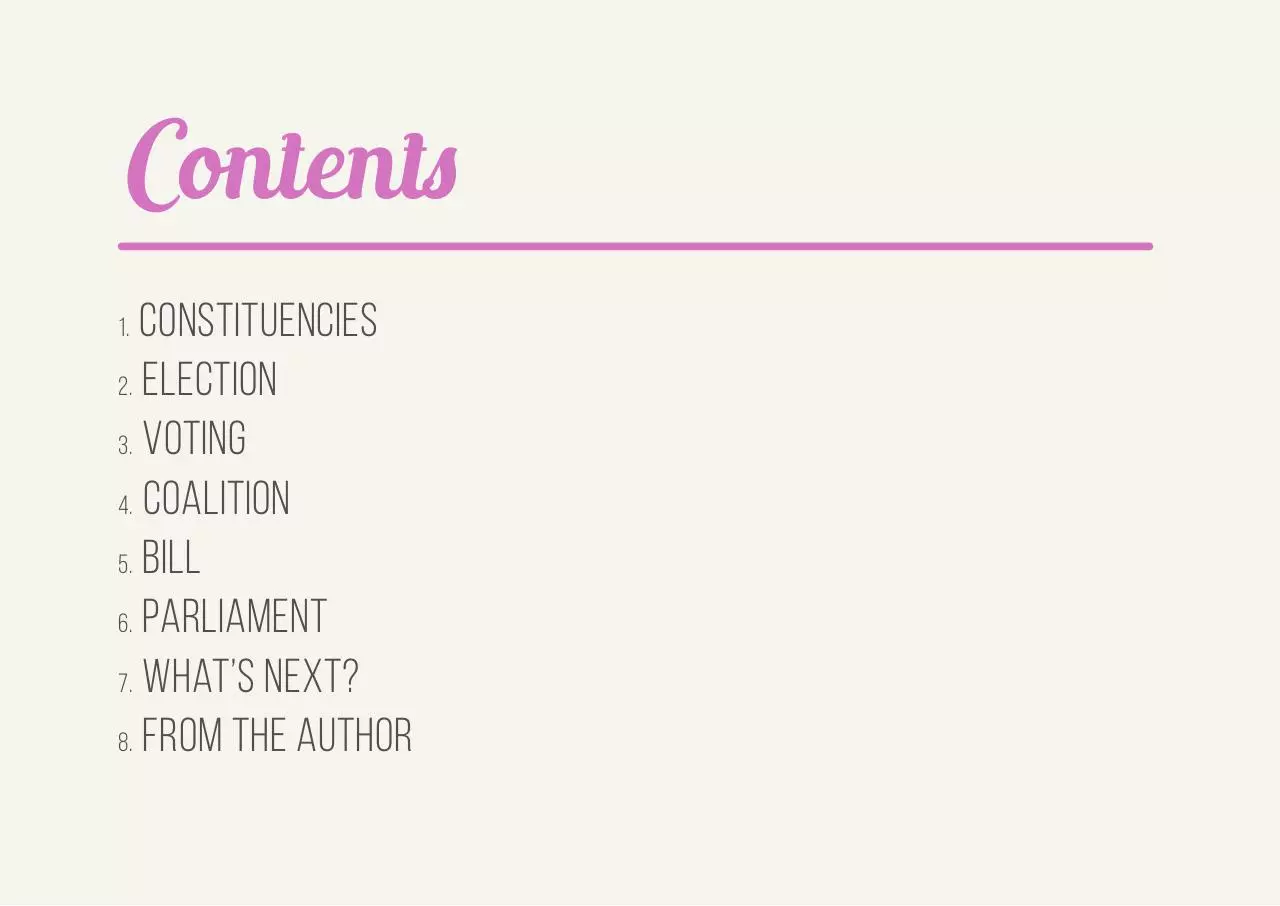
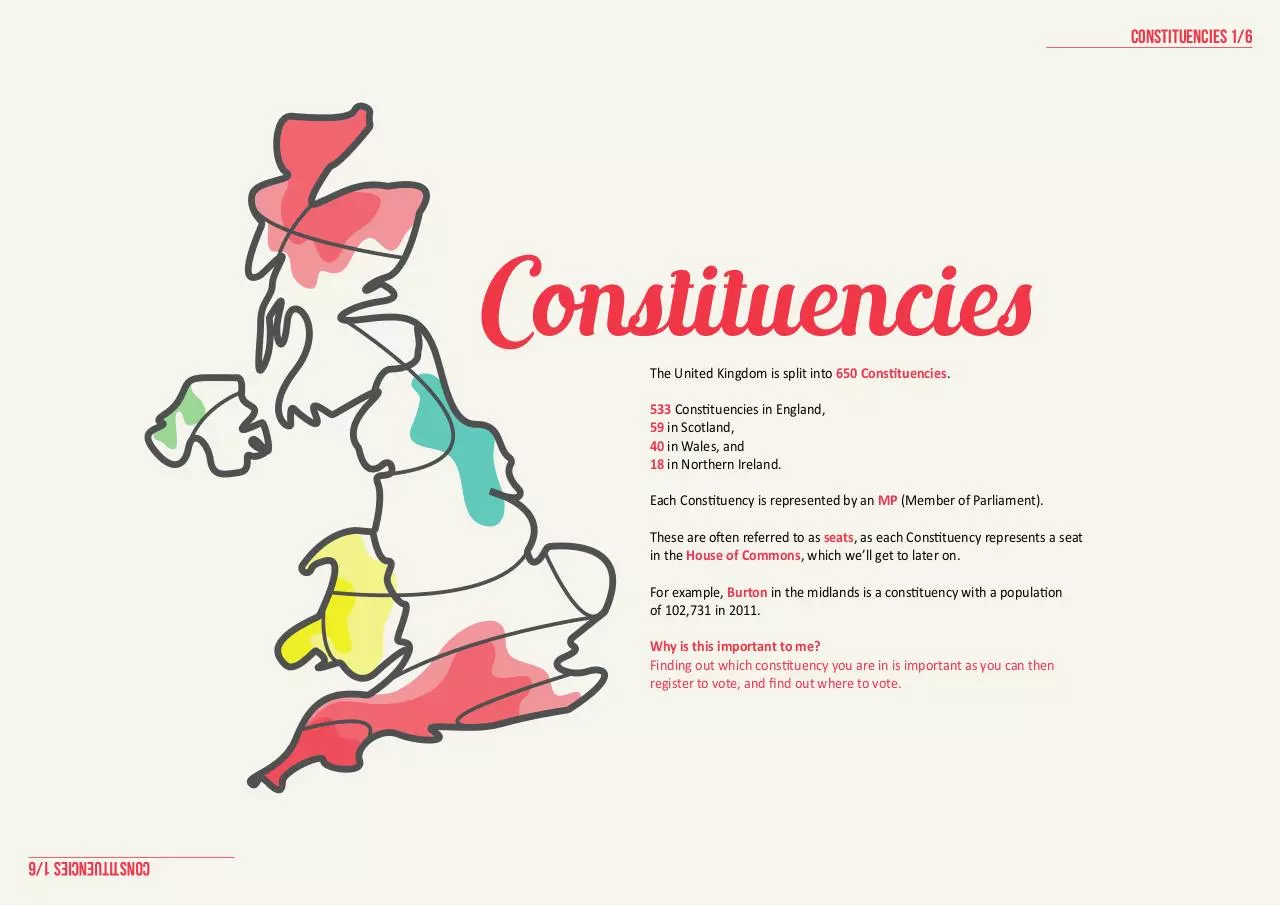
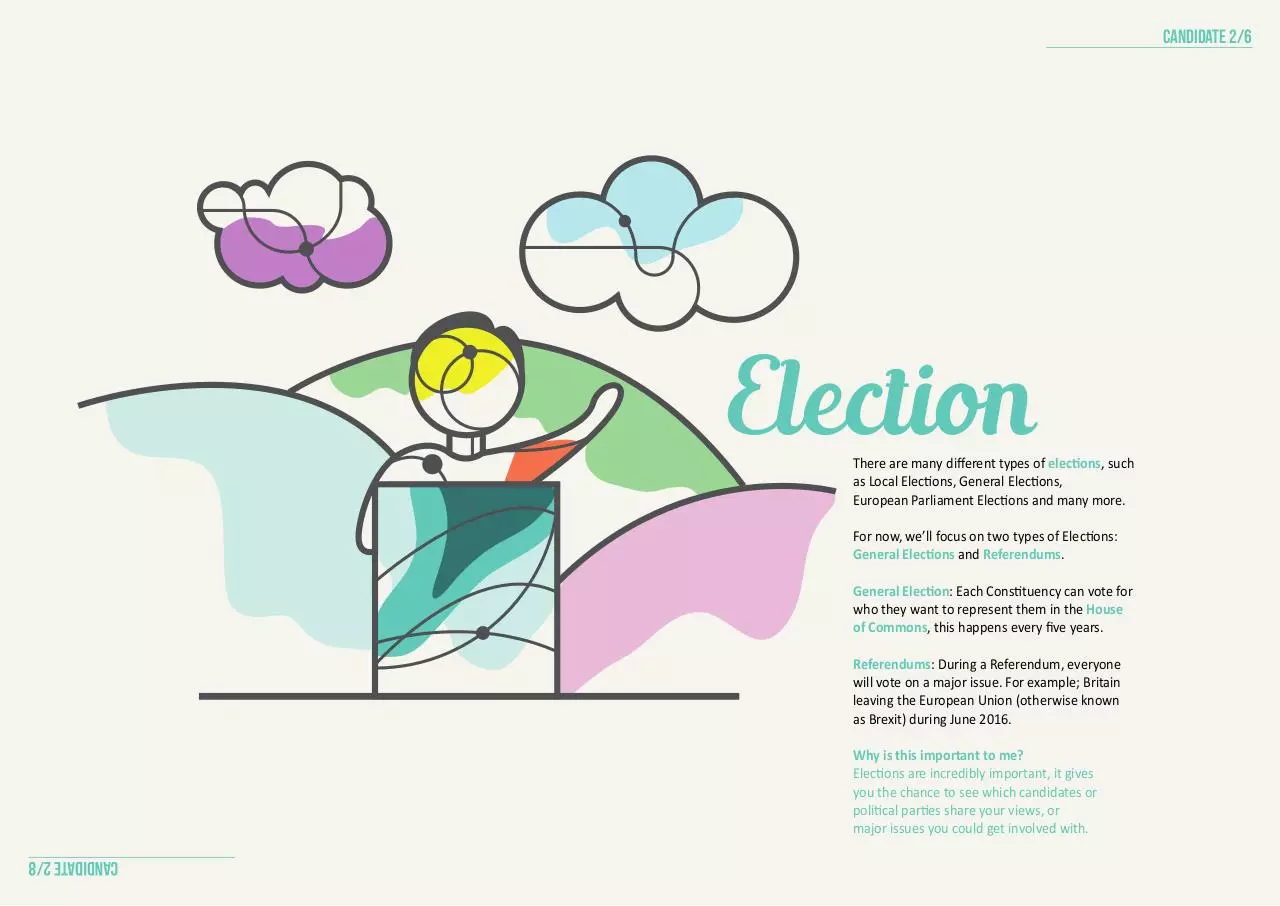
File preview
STARTER
GUIDE TO
BRITISH
Politics
By Alexander Williams
Confused about politics?
Unsure where to start?
This is the perfect GUIDE for you.
Contents
Constituencies
2. Election
3. Voting
4. Coalition
5. Bill
6. ParliamenT
7. What’s Next?
8. from the author
1.
Constituencies 1/6
Constituencies
The United Kingdom is split into 650 Constituencies.
533 Constituencies in England,
59 in Scotland,
40 in Wales, and
18 in Northern Ireland.
Each Constituency is represented by an MP (Member of Parliament).
These are often referred to as seats, as each Constituency represents a seat
in the House of Commons, which we’ll get to later on.
For example, Burton in the midlands is a constituency with a population
of 102,731 in 2011.
Why is this important to me?
Finding out which constituency you are in is important as you can then
register to vote, and find out where to vote.
Constituencies 1/6
Candidate 2/6
Election
There are many different types of elections, such
as Local Elections, General Elections,
European Parliament Elections and many more.
For now, we’ll focus on two types of Elections:
General Elections and Referendums.
General Election: Each Constituency can vote for
who they want to represent them in the House
of Commons, this happens every five years.
Referendums: During a Referendum, everyone
will vote on a major issue. For example; Britain
leaving the European Union (otherwise known
as Brexit) during June 2016.
Why is this important to me?
Elections are incredibly important, it gives
you the chance to see which candidates or
political parties share your views, or
major issues you could get involved with.
Candidate 2/8
Postal Vote 3/6
Voting
There are different types of ways to vote, the main two
being ballot box voting or absentee vote.
During a General Election or a Referendum, each
Constituency will allocate voting stations across towns all
over the United Kingdom.
This is where you would usually go to vote, unless you
are doing an absentee vote, otherwise known as a
postal vote. This is where you would post your vote
if you were unable to visit a voting station for any
reason whatsoever.
Postal vote 3/6
Coalition 4/6
Political
Party
Most candidates that run for an Election are part of a
Political Party, such as The Conservatives, Labour, or
The Liberal Democrats. There are lots of different parties
all with seperate methods and goals, so take care when
voting and make sure you research a wide variety of
parties to see which you agree with.
Candidates that aren’t part of any Party are called
Independents.
In the House of Commons, the Political Party that has the
most Constituencies (over half) wins control of the
House of Commons for the next five years.
Important to note: During 2010, there was a Co-alition.
This meant that no political party had over half of the
Constituencies, and two parties came together to form
a Government, the Conservatives and Liberal Democrats.
Coalition 4/6
BILL 5/6
Bill
A bill is a drafted proposal for a new law, or a proposal
to change an existing law.
Bills are passed through our Parliament and then given
Royal Assent, which means the bill is sent to the reigning
monarch to pass. Currently, this is the Queen.
Bills can take a long time to pass through parliament, for
example: the High Speed Rail (London - West Midlands)
Act 2017 was introduced on 25th November 2013 but
was introduced on 23rd February, 2017.
Once a bill has been passed, it becomes a law.
Bill 5/6
Government 6/6
Parliament
In the United Kingdom, we are a Constitutional Monarchy.
This means the King or Queen whom reigns does not
make open political decisions, we have a Parliament for
that: the House of Commons and the House of Lords.
The House of Commons is run by a Political Party that has
won more than half of the Constituencies around the
United Kingdom, as stated before. The political party
that wins can form a government body with roles such as:
Prime Minister, Secretary of State and Chancellors
The House of Lords is slightly different as it’s members
are not elected by the nation, they are appointed.
Government 6/6
Download Starter guide to British politics
Starter guide to British politics.pdf (PDF, 309.76 KB)
Download PDF
Share this file on social networks
Link to this page
Permanent link
Use the permanent link to the download page to share your document on Facebook, Twitter, LinkedIn, or directly with a contact by e-Mail, Messenger, Whatsapp, Line..
Short link
Use the short link to share your document on Twitter or by text message (SMS)
HTML Code
Copy the following HTML code to share your document on a Website or Blog
QR Code to this page

This file has been shared publicly by a user of PDF Archive.
Document ID: 0000588462.